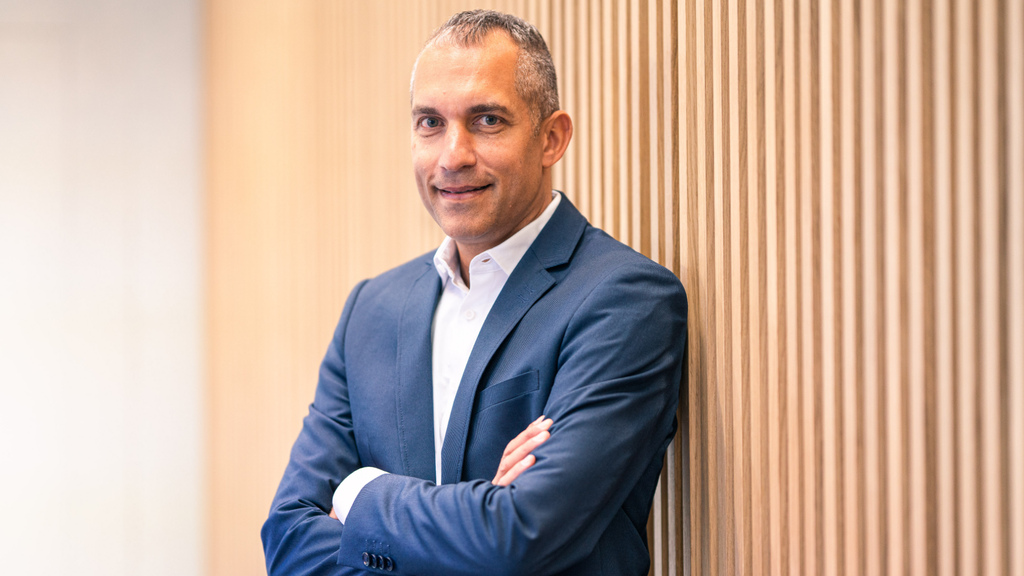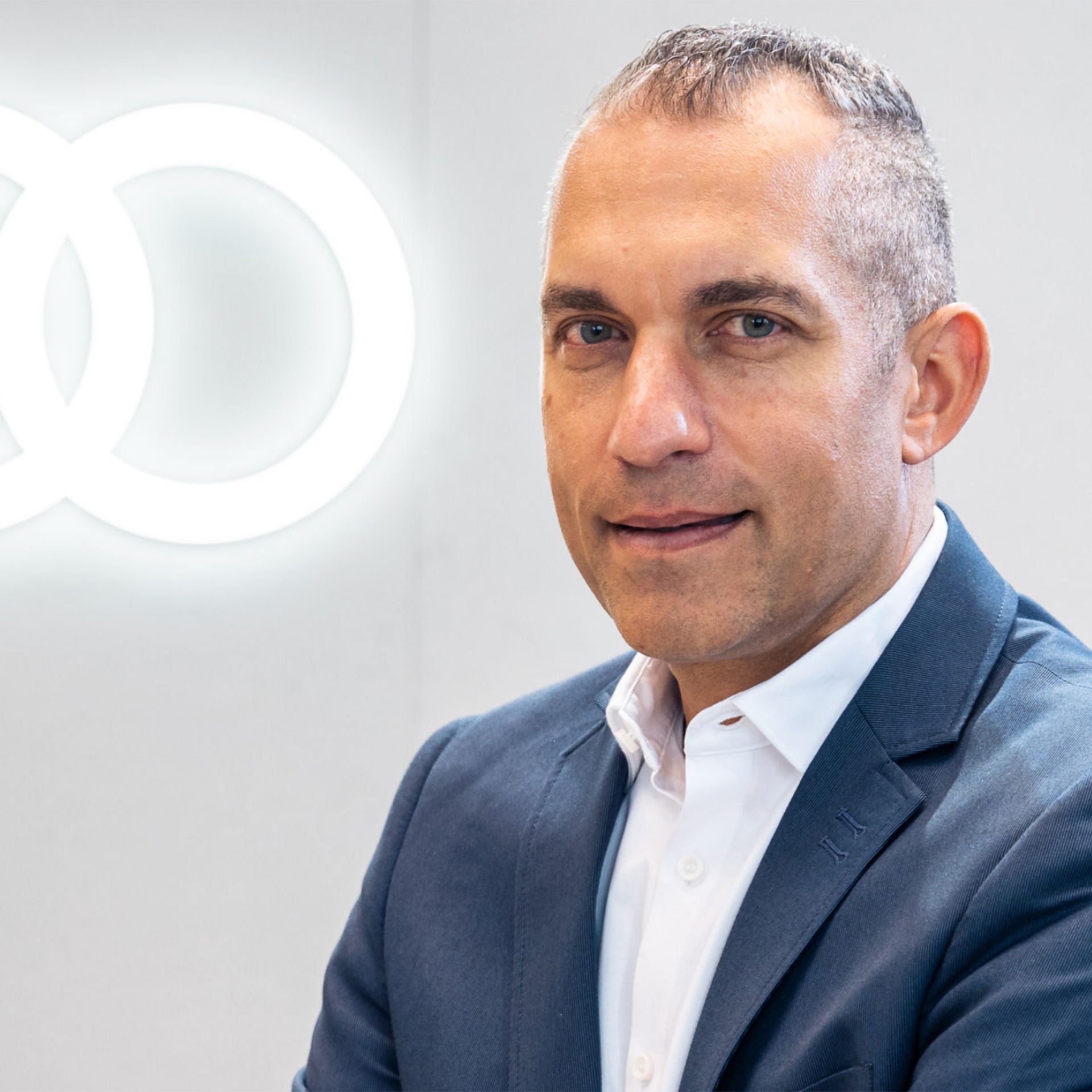Human rights & Audi: Taking action instead of looking the other way
missing translation: fa.article-intro.reading-time – 07/28/2023

Since the beginning of 2023, Daniel Patnaik has been coordinating and monitoring the observance of human rights within the Audi Group and along the supply chain in his role as Human Rights Officer.
Since the beginning of 2023, Daniel Patnaik has been coordinating and monitoring the observance of human rights within the Audi Group and along the supply chain in his role as Human Rights Officer.
Mr. Patnaik, in what way are human rights an issue at Audi?
Patnaik: As a globally active car manufacturer, Audi bears a great deal of responsibility – for the environment, for its own employees and for society as a whole. And therefore also for the people along the Audi supply chain who are at work for the company. This responsibility is very important to us, which is why we have made it one of our four corporate values, along with appreciation, openness and integrity.
We therefore consider it a matter of course not only to commit ourselves to respecting and observing human rights, but also to taking on as much responsibility as we possibly can. However, we also realize that risks such as human rights violations do exist, and with tens of thousands of employees and suppliers, we can’t rule these risks out one hundred percent. We must therefore gain a precise understanding of the risks and their causes, and then develop or refine measures to ensure that they do not occur in the first place – or that they can be dealt with and remedied effectively.
What does that mean for your daily work?
Patnaik: I’m the central point of contact at Audi for everything to do with human rights. My team and I review, analyze and monitor all of the Audi Group’s activities that are relevant to human rights and create systems for such things as risk identification, risk analysis and risk assessment, along with concrete preventive measures. These systems follow the Plan-Do-Check-Act logic, which is a classic management approach.
That the subject of human rights is firmly embedded in our established compliance management system is a major plus for our work. What’s also very important from my point of view is the transparency that we’re going to create as of 2024 with a detailed annual report on the fulfillment of our due diligence obligations, which will be made available to our Board of Management and the Economic Committee, as well as to employees, authorities and the public – to name just a few of our stakeholder groups.
Responsibility, openness, appreciation and integrity as core corporate values
What are the focal points of your work at the moment?
Patnaik: We’re currently preparing a uniform human rights strategy. For this purpose, we’re also drawing on the valuable work that is already being done within the company, such as the identification and assessment of risks, the S-Rating – in other words, the sustainability rating for supplier companies – and the supply chain grievance mechanism, along with the resulting measures in the subsidiaries of the Audi Group. We are taking this solid foundation and developing it further on the basis of current and future legal requirements. And we’re enhancing our processes so that we can identify and resolve conflicting goals at an early stage based on a realistic view.
Take the grievance mechanism for human rights violations, for example: The objective here is not only to follow up on a tip-off and remedy a risk, but also to eliminate causes, recognize possible patterns and thereby identify general improvements to the overall process.
We have to ask ourselves questions such as: Why is the grievance mechanism used only by a certain group of people and not by others? Are there any hurdles that people need to overcome before filing a grievance or that prevent them from doing so altogether?
Daniel Patnaik brings more than 20 years of international experience as a company lawyer for Audi and Volkswagen to the role of Human Rights Officer. He reports directly to the Audi Board of Management. By creating the position of Human Rights Officer, Audi is reinforcing the company’s alignment with the ESG criteria.

Audi prepared itself well for the new Supply Chain Due Diligence Act. From your perspective as Human Rights Officer, what aspects deserve particular attention now?
Patnaik: The central question is: Which measures can we take to appropriately deal with – and ideally solve – which problem at which stage in which supply chain? The Supply Chain Due Diligence Act encourages us to manage risks in the deeper supply chain. This confirms our existing approach – particularly in the course of the electrification of our products – of paying attention to raw materials supply chains.
The complex, multi-layered nature of our supply chains means that we need to use the right tools for each risk and each problem – or to develop them in the first place. Only then can we act appropriately at all stages of the value chain. This is a major challenge, but it also shows just how much positive influence our brand group is able to exert: For some time now, we have required our approximately 14,000 direct suppliers in more than 60 countries to accept our Code of Conduct for Business Partners and to pass it on to any subcontractors.
This Code of Conduct sets out our fundamental requirements with regard to human rights and the environment – as an unalterable part of our contracts. For the past five years, on the initiative of Audi Procurement, we have been using the sustainability rating for suppliers mentioned earlier, which forms the basis for a business relationship and verifies compliance with the Code of Conduct even before the contract is awarded. In addition, we have mandatory risk-based training courses on human rights and the environment. This action area is huge and will never be completed. It also requires a change in attitude and a focus on the people who are affected by our actions. It’s about constantly improving, seizing upon current developments in the political, legal and social spheres, and also helping to shape them wherever possible.
“It goes without saying that we are committed to respecting and observing human rights and to taking as much responsibility as we possibly can.
Daniel Patnaik, Audi Human Rights Officer
Is the fact that Audi is a member of the Volkswagen Group an advantage in any way?
Patnaik: It’s a big advantage because we can take a joint strategic approach. One example of Audi’s contribution is its lead role in the procurement of aluminum. The reason behind this is that we have many years of experience in lightweight construction. Just think of the industry’s first-ever all-aluminum body, which we launched on our Audi A8 back in 1994. And that doesn’t just apply to aluminum. Another 15 high-risk raw materials have been identified in the Volkswagen Group, and there’s a report on risk mitigation activities.
Not just demanding human rights, but standing up for them
Now that we’ve covered the professional side of things, I’d like to ask you a personal question: What motivates you to stand up for human rights?
Patnaik: The foundation stone was laid many years ago. During my law studies, I had the chance to attend a meeting of the Human Rights Commission in Geneva. The discussions and commitment I witnessed there made a lasting impression. The topic has stayed close to my heart throughout the 20-plus years I’ve spent as a company lawyer at Audi and Volkswagen. So my work as Human Rights Officer at Audi now brings me full circle. That’s one reason.
And the other?
Patnaik: When I was young, I traveled to India with my father, where he was very actively involved in educational projects. Through these projects, I came into contact with workers who hewed blocks of stone under the most adverse conditions to make gravel for use in road construction – adults as well as children. I saw and learned a lot of things at the time that still move me today. The rights that we have as European citizens – and that we often take for granted – are not necessarily enjoyed by people in other regions. That’s something we have to be aware of as a globally active company. And doing something about this is one of the things that drives me.
Guiding principles of action
More details
Audi has signed the Universal Declaration of Human Rights, the principles of the International Labor Organization and of the OECD, the principles of the Rio Declaration on Environment and Development and the UN Convention against Corruption. In addition, after a break of several years, the company once again joined the UN Global Compact, the world’s largest initiative for sustainable corporate governance, in March 2022. This membership in one of the most active platforms for dialogue among industry, civil society and politics is an important pillar of stakeholder management for Audi.
At Audi, the Volkswagen Group Essentials, the Leadership.Compass and the Audi corporate values of appreciation, openness, responsibility and integrity all constitute the fundamental values and foundation of our corporate culture.
The guiding behavioral principles for the Audi Group’s employees are described in the Code of Conduct. The Code of Conduct supports employees in their daily duties in the company. It provides guidance, advice and support on correct behavior at the workplace, as a business partner and as a member of the company. The Code of Conduct is binding for every employee, regardless of his or her position in the hierarchy.
The Code of Conduct provides clear rules on correct conduct in a transparent and easily understood form and is constantly made accessible to all employees. The emphasis is on dialogue and exchange. Practical examples illustrate the individual subject areas and help employees apply the rules.
In addition, there is a Code of Conduct for Business Partners, which contains key requirements relating to human rights and environmental protection. It has been an integral part of the contracts between Audi and its business partners for many years.
